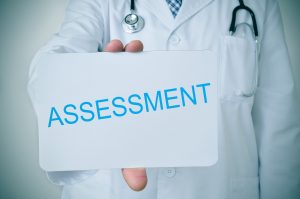1. On admission to hospital orientate the patient to the ward and the toilet areas. Ensure they are made aware of any call bell system.
2. Identify and document routine urinalysis (on non catheterised patients):
- Negative – no action required.
- Positive – inform doctor.
- Obtain MSU – treat UTI if present.
- Document in notes.
3. If the patient is catheterised, then commence Catheter-associated Urinary Tract Infection (CAUTI) care plan and catheter passport (as per local protocol).
4. Ask all patients on admission about previous bladder function and if their bladder function has caused any problems in the past:
- If Yes, commence full assessment.
- If No, monitor and commence full assessment should bladder function change once UTI/constipation ruled out and treated.
5. Establish the type of bladder dysfunction and the cause.
6. Commence full assessment and collect the following evidence:
- 3 day frequency/volume chart input/output.
- Bowel chart – always document date of last bowel movement prior to
- Post void residual scan/s.
- Medical staff – review medications and physical examination. Consider if onward referral appropriate as per referral guidelines.
7. Commence treatment/management care plan:
- See types of urinary dysfunction and treatment options.
- Commence relevant care plan according to type of urinary dysfunction diagnosed.
- Stress incontinence
- Urgency/urge incontinence (overactive bladder) (with or without incontinence)
- Mixed urge and stress incontinence
- Incomplete bladder emptying/overflow incontinence
- Functional incontinence
- Nocturia
8. On discharge always supply a seven day supply of pads, sheaths or catheter home pack ![]() with one catheter on discharge.
with one catheter on discharge.
If the patient is going home:
- Contact the District Nurse to inform of the current care plan and request reassessment of the patient at home.
- Ensure records are updated including details of elimination and continence issues.
9. Refer to the Bladder and Bowel Nurse Specialist as soon as possible if treatment/management is not effective.
Urinary Dysfunction: Assessment, Care Planning and Onward Referral
